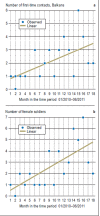Deployment-related stress disorder in german soldiers: utilization of psychiatric and psychotherapeutic treatment
- PMID: 23130090
- PMCID: PMC3446197
- DOI: 10.3238/arztebl.2012.0569
Deployment-related stress disorder in german soldiers: utilization of psychiatric and psychotherapeutic treatment
Abstract
Introduction: Military missions abroad carry a high risk of psychological traumatization. In this study, we examined the reasons for increased utilization of the treatments offered to soldiers by the German armed forces' psychiatric services.
Method: We analyzed trends in initial contacts with psychiatrists and psychotherapists among German soldiers participating in missions to Afghanistan and the Balkans. To this end, we evaluated existing data from the psychiatric services of all German Armed Forces Military Hospitals with respect to sociodemographic factors (sex, area of mission) and the underlying psychiatric disorders over an 18-month period (January 2010 to June 2011).
Results: 615 soldiers made an initial contact with the psychiatric and psychotherapeutic services during the study period. The total number of first contacts did not change significantly (p = 0.195), but there was a notable rise in the number of first contacts by female soldiers with deployment-related stress (p = 0.003). Mission-specific statistics revealed a significant increase in the number of first contacts only for soldiers deployed to the Balkans (p = 0.017). 91% of soldiers making a first contact were given the diagnosis of a stress reaction (ICD-10: F 43); the second most common diagnosis (8.9%) was an affective disorder (ICD-10: F 32.0, F 32.1).
Conclusion: Despite psychological prevention efforts, military missions abroad often lead to mental disorders. Our findings indicate that the mild observed increase in incidence is both sex-specific and deployment-area-specific.
Figures



References
-
- Bundesministerium der Verteidigung, Abteilung Personal-, Sozial- und Zentralangelegenheiten I 8. Die Stärke der Streitkräfte Bundeswehr, 25. Juli 2011. www.bundeswehr.de. (last accessed on 28 July 2011)
-
- Hauffa R, Brähler E, Biesold KH, Tagay S. Psychische Belastungen nach Auslandseinsätzen: Erste Ergebnisse einer Befragung von Soldaten des Einsatzkontingentes ISAF VII. Psychotherapie, Psychosomatik, Medizinische Psychologie. 2007;57:373–378. - PubMed
-
- Hoge CW, Auchterlonie JL, Milliken CS. Mental health problems, use of mental health services, and attrition from military service after returning from deployment to Iraq or Afghanistan. JAMA. 2006;295(9):1023–1032. - PubMed
-
- Sareen J, Cox BJ, Afifi TO, et al. Combat and peacekeeping operations in relation to prevalence of mental disorders and perceived need for mental health care. Arch Gen Psychiatry. 2007 64;(7):843–852. - PubMed
-
- Maguen S, Lucenko BA, Reger MA, et al. The impact of reported direct and indirect killing on mental health symptoms in Iraq war veterans. J Trauma Stress. 2010;23(1):86–90. - PubMed
MeSH terms
LinkOut - more resources
Full Text Sources
Medical

